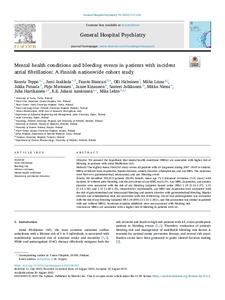Mental health conditions and bleeding events in patients with incident atrial fibrillation: A Finnish nationwide cohort study
Teppo Konsta; Jaakkola Jussi; Biancari Fausto; Halminen Olli; Linna Miika; Putaala Jukka; Mustonen Pirjo; Kinnunen Janne; Jolkkonen Santeri; Niemi Mikko; Hartikainen Juha; Airaksinen KE Juhani; Lehto Mika
https://urn.fi/URN:NBN:fi-fe2022102463094
Tiivistelmä
OBJECTIVE
We assessed the hypothesis that mental health conditions (MHCs) are associated with higher risk of bleeding in patients with atrial fibrillation (AF).
METHODS
The registry-based FinACAF study covers all patients with AF diagnosed during 2007-2018 in Finland. MHCs of interest were depression, bipolar disorder, anxiety disorder, schizophrenia, and any MHC. The outcomes were first-ever gastrointestinal, intracranial, and any bleeding event.
RESULTS
We identified 205,019 patients (50.9% female; mean age 72.3 [standard deviation 13.4] years) with incident AF without prior bleeding, and the prevalence of any MHC was 6.1%. Any MHC, depression, and anxiety disorder were associated with the risk of any bleeding (adjusted hazard ratios (HRs) 1.19 [1.12-1.27], 1.21 [1.13-1.30], and 1.21 [1.08-1.35], respectively). Additionally, any MHC and depression were associated with the risk of gastrointestinal and intracranial bleeding and anxiety disorder with gastrointestinal bleeding. Bipolar disorder and schizophrenia were not associated with risk of bleeding. Use of oral anticoagulants was associated with the risk of any bleeding (adjusted HR 1.24 [95% CI 1.21-1.28)]), and this association was similar in patients with and without MHCs. Serotonin reuptake inhibitors were not associated with bleeding risk.
CONCLUSIONS
MHCs are associated with a higher risk of bleeding in patients with AF.
Kokoelmat
- Rinnakkaistallenteet [29335]
